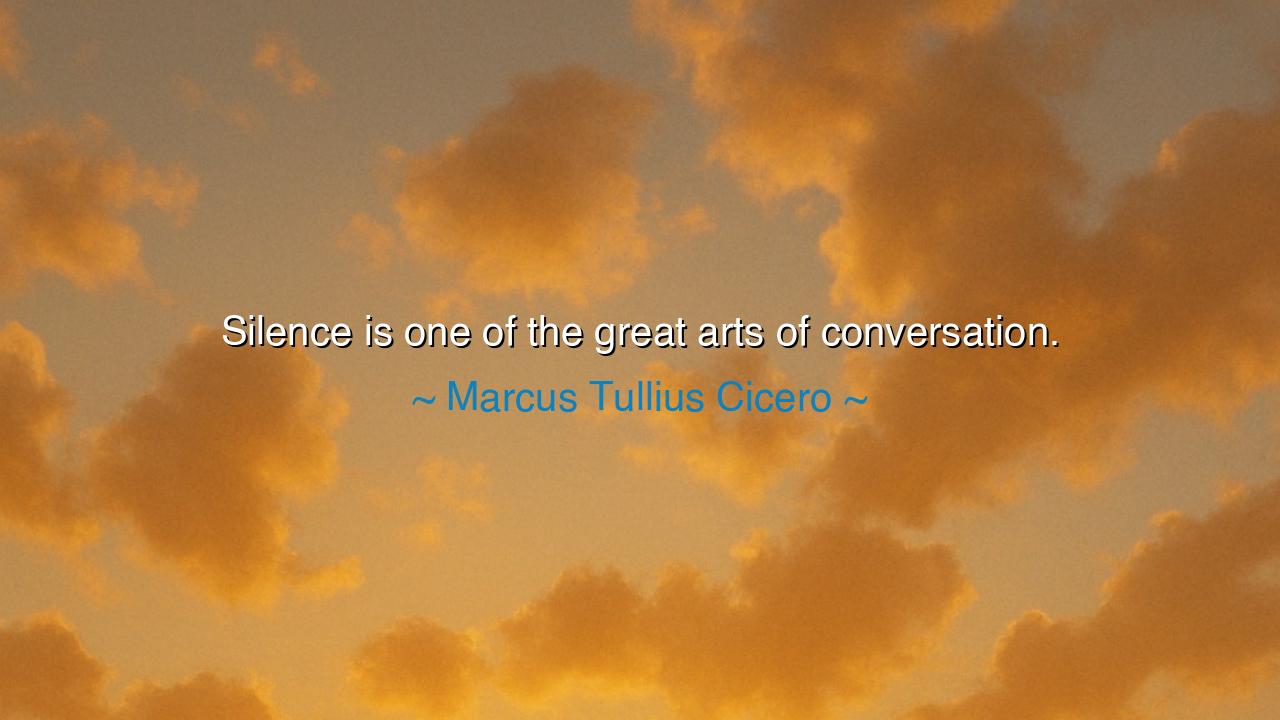
Silence is one of the great arts of conversation.






When Marcus Tullius Cicero said, “Silence is one of the great arts of conversation,” he revealed a truth as subtle as it is profound — that wisdom does not always speak, but listens, and that silence, when held with intention, can be more eloquent than speech. These words, uttered by one of Rome’s greatest orators, remind us that mastery of the tongue begins with mastery of restraint. In the grand arena of discourse, where voices rise and clash like waves upon stone, it is often the calm observer — the one who listens deeply before replying — who carries the true power of understanding. For silence, though empty in sound, is full in meaning; it is the soil in which thoughtful words are born.
The origin of this quote lies in Cicero’s lifelong meditation on rhetoric, philosophy, and statesmanship. As one who lived through the turbulent final years of the Roman Republic, Cicero knew the weight of words — how they could build republics or destroy them. He saw how men of great intellect could lose themselves in the noise of argument, mistaking verbosity for wisdom. Through his experiences as a lawyer, senator, and philosopher, he came to see that conversation was not a contest of tongues, but a communion of minds — and that silence, strategically placed, is as essential to that communion as speech. It was not only what one said that mattered, but when one chose not to speak.
The ancients revered silence as a teacher. Pythagoras, the philosopher of harmony, required his students to observe a vow of silence for five years before they were allowed to speak in his school, believing that listening purified the mind. Socrates, too, would wait in long pauses before answering his interlocutors, allowing the silence to deepen the question, to draw out truth from within the other’s soul. To them, silence was not the absence of communication, but its refinement — the still space where understanding gathers strength before it takes form in words. Cicero, inheriting this wisdom, saw that true eloquence requires not only the art of saying the right thing, but the discipline of knowing when to say nothing at all.
Consider the story of Abraham Lincoln, a man centuries removed from Cicero, yet a master of the same art. During his presidency, amid the fires of civil war, he was known for his long, thoughtful silences in meetings. His advisers would argue passionately, their voices heavy with conviction and urgency, while Lincoln sat quietly, gazing out the window or tracing the grain of his desk. Only after the room had exhausted itself would he speak — briefly, simply, and decisively. His silence was not ignorance nor indecision, but depth. It allowed him to hear not only the words spoken but the motives beneath them. In that stillness, he found clarity — and his nation found guidance.
Silence, when used rightly, is not a retreat but a form of strength. It is the pause between notes that makes music beautiful, the calm that gives weight to thunder. In conversation, silence allows the heart to catch up with the mind; it makes space for reflection, for empathy, for wisdom to ripen. Too many speak to be heard, yet few listen to understand. Cicero teaches us that the greatest interlocutor is not he who dominates, but he who creates space for others to unfold. Through silence, we give others the gift of being truly heard — and in hearing them, we learn more of ourselves.
But silence can also be a shield. In times of anger or deceit, when words are sharpened as weapons, silence preserves dignity. The Stoics taught that one should not be quick to react, for every rash word is a chain that binds the soul to regret. Cicero himself faced such moments in the Senate — surrounded by those who sought to twist his words or lure him into imprudence. His restraint, his ability to remain composed amid provocation, became part of his legend. To stay silent when tempted to rage is not weakness — it is mastery. For silence, held in strength, is the armor of wisdom.
So, my listener, take this ancient teaching into your heart: learn to listen more than you speak, for the measure of your wisdom is not in the sound of your words but in the stillness that shapes them. In conversation, seek not victory, but understanding. Pause before you reply. Let silence be your ally, not your fear. For in that quiet, the truth of others will reveal itself — and so too will your own.
And remember: silence is not emptiness, but the breath of the soul between thoughts. It is the wellspring from which the clear voice of reason flows. As Cicero reminds us, the greatest art of conversation is not in endless speech, but in the delicate balance between words and quiet — between expression and reflection. So master this art, and you will find that your words, when finally spoken, will carry the weight of thought, the depth of compassion, and the enduring echo of wisdom.






AAdministratorAdministrator
Welcome, honored guests. Please leave a comment, we will respond soon